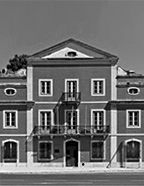

................................
Historiography
I
Another important factor closely linked to patriotism in nation-building was the commemoration of the national past. The Academy routinely celebrated anniversaries with commemorative sessions, which included the birth of the 2nd Viscount of Santarém, the figure of the recently deceased António de Vasconcelos, Cardinal Francisco Saraiva, Oliveira Martins, and even the newly elevated Academic of Merit, Paulo Merêa. In almost all sessions of this nature, some kind of patriotic justification was given, for example, in the case of the 2nd Viscount of Santarém, "a great figure who rendered such relevant services to Science in general, and to Portuguese glory in particular" and "So great was his action that it is still projected and stands out in the annals of Portuguese patriotic erudition" (APH, Bulletin 1941, 113). Essentially, praising patriotic historians was not only praising the Nation that sustained them but also the past narrated by them. This was evident in "the science and patriotism with which Mr. [Joaquim] Bensaúde confronted German erudition, defending Portuguese nautical science, in whose history the period from 1430 to 1530 was one of remarkable progress, exclusively due to the Portuguese." (APH, Bulletin 1943, 78-79).
The Academy also participated in commemorations in a broader and cooperative manner with other institutions, mainly the State. It contributed with iconographic elements for series of stamps commemorating Portuguese kings and warriors, investigating, for example, the location of the Battle of Valdevez. Even foreign historians participated in this type of activity, such as the German, Georg Otto Schurhammer, in the case of the latter, by publishing a work in commemoration of the discovery of Japan (Schurhammer, "Descobrimento" ["Discovery,"] Annals, Vol. 1, Series II, 17-172). The APH also participated in the celebrations of the 4th centennial of Ponta Delgada, the 5th centennial of the discovery of Guinea (at the request of the academic Marcelo Caetano, Minister of the Colonies at the time), and of course, in the celebrations of the double centennial of 1939-1940, dedicating to it the publication of the first series of Annals. In fact, even the Academy members' view of these works was elucidative of the importance that patriotism, memory, and history had as a relational entity. Afonso Dornelas, the first secretary-general of the Academy, said in 1940 that academics should be invited "to present works, in order to form volumes, which, in the future, will allow us to appreciate the degree of culture and patriotism with which the past was understood in 1940" (APH, Bulletin 1940, 71-72).
